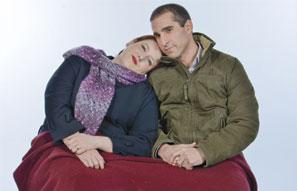When Thomas Wolfe wrote You Can’t Go Home Again in the 1930s, he might well have been talking to generations of gay people who have been ostracized by their families. But this is 2012, and Vancouver playwright David Blue is out to prove that perhaps it is possible to go home again.
A departure from the usual comedy for Blue, who has written and produced works that include Memoirs of a Single Gay White Male and The Most Happy Fag in the World, his new play, Home Again, is not only more serious, it is also more personal.
Set in rural Saskatchewan, Home Again tells the story of Walt, who returns with his partner, Ray, to his small hometown after having been thrown out of the house for being gay many years ago. Reunited with siblings Claire and Toby for their father’s funeral, Walt seeks to reconcile with both his feelings and his mother after discovering a surprise in his father’s will.
Citing an always awkward relationship with his stepmother, whom Blue was shocked to discover had descended into chronic alcoholism when he returned home one year for a funeral, Blue found inspiration for the character of the family matriarch in Home Again.
“Some characters are based on other members of my family, as well, and some of them are combinations,” he says. “My older and younger brothers became a combination of Toby [the brother], my sister Jennifer and my best friend growing up became Claire [the sister], and my Aunt Ruth became Anna [the housekeeper].”
Despite the influence his family has had on his characters and the story, Blue is quick to point out that amongst the truth is also much fiction. “You have to make it interesting,” he laughs.
After completing his run of Confessions of a Mad Drag Queen last summer, Blue began looking for his next project and came across an early draft of Home Again. More comfortable as a comedy writer, Blue recognized both the challenge he faced in writing this more serious piece and the catharsis he achieved in completing it.
“For me comedy is a lot easier to write, but sometimes you have to challenge yourself,” he says. “I wanted to tell this story, and I kept coming back to it. I guess there was some psychological stuff that I needed to deal with.”
Part of dealing with the ghosts from his past included the inevitable rewrites that toned down some of the harsher scenes, including the end of the first act, where Walt confronts his mother. Besides, Blue says, the play is about family, not just about a relationship between mother and son.
“The bulk of the second act was just between Walt and his mother, and it was just so angst-filled, you just knew Tennessee Williams would be slashing his wrists,” Blue laughs. “Sure, it’s about a dysfunctional family, but it is still based in some reality.”
With family and home such an integral part of his story, Blue took time early in the rehearsal process with his cast and production team to explore what those terms mean to each of them. He was amazed by the drastically different answers he received.
“For a lot of gay men and women there are all kinds of negative feelings about their childhood homes, and it is sad,” Blue concludes. “Home and family is what you have chosen; it can be anything you want it to be, and, as the title suggests, there is a possibility that one really can go home again.”

 Why you can trust Xtra
Why you can trust Xtra


